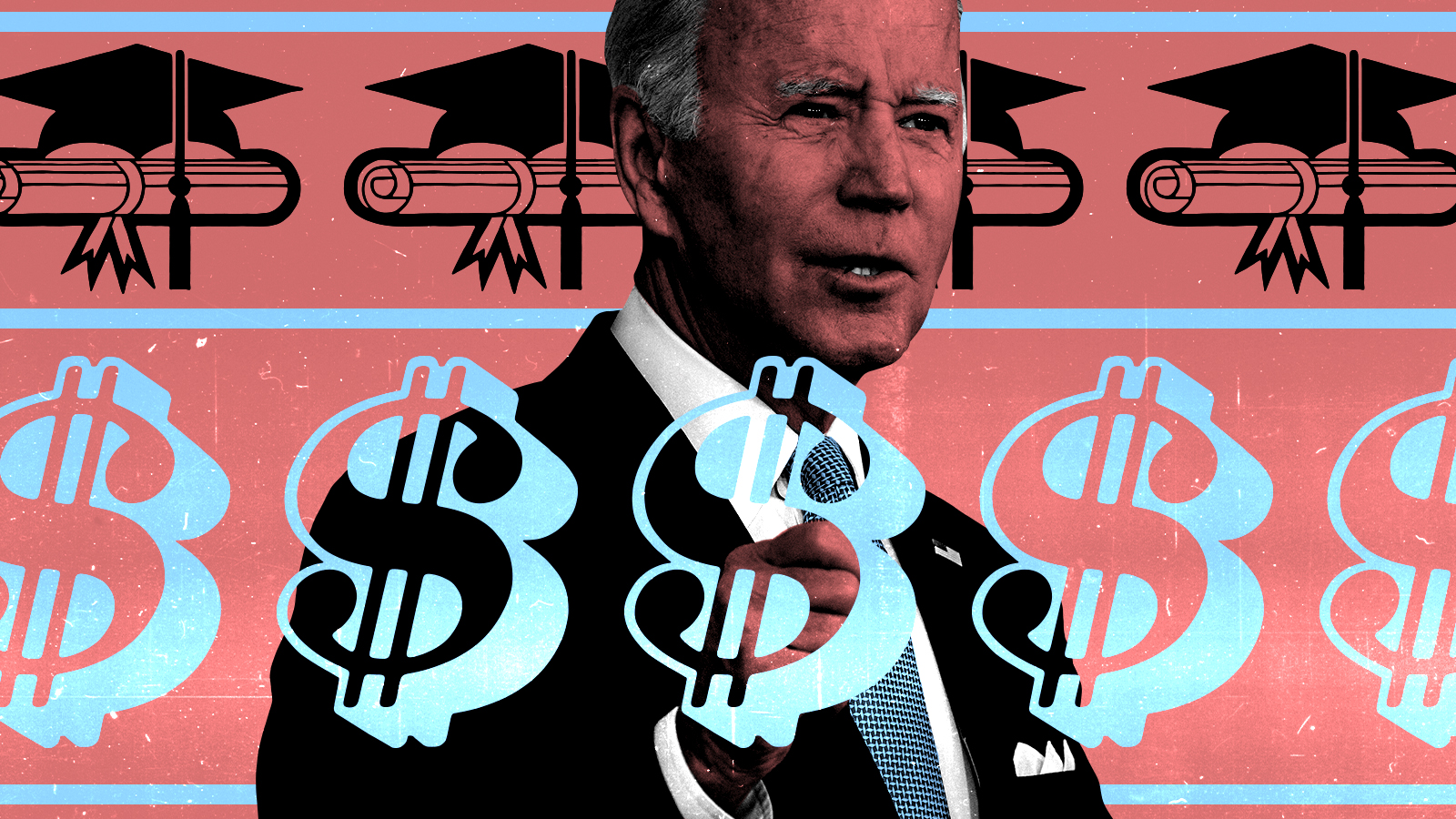Biden owes his core voters student loan forgiveness
Forget Congress — Biden needs to nix student loans


A free daily email with the biggest news stories of the day – and the best features from TheWeek.com
You are now subscribed
Your newsletter sign-up was successful
Although Senate Majority Leader Chuck Schumer (D-N.Y.) has historically been one of the loudest political voices in support of student loan debt cancellation, he warned this week not to expect any meaningful action from Congress on the matter.
Citing the evenly split Senate and thin Democratic majority in the House, Schumer explained why Congress shouldn't even bother debating student loan debt legislation. "You read about the tough time we're having with legislation, the bill to build roads, bills to make prescription drug costs lower, the bills to get a tax break and get our kids out of poverty and get them to get a good education, to help small businesses," he said at a virtual event hosted by Mitú, a Latino digital media company. "Those all require the House and Senate to pass it, but these days, with the partisanship, filibuster, and all that, it's not so easy."
Schumer is correct in saying partisanship and the filibuster impact a myriad of issues that can be addressed with legislation. But his comments also suggest that, of all the things to fight for, student debt is not a priority for congressional Democrats. Unfortunately, this about-face comes as no surprise: As a Black person who likes to vote and hates police brutality, I'm all too familiar with how quickly the rhetoric from Democratic leadership can shift to passive language following an election.
The Week
Escape your echo chamber. Get the facts behind the news, plus analysis from multiple perspectives.

Sign up for The Week's Free Newsletters
From our morning news briefing to a weekly Good News Newsletter, get the best of The Week delivered directly to your inbox.
From our morning news briefing to a weekly Good News Newsletter, get the best of The Week delivered directly to your inbox.
But student loan debt is the perfect issue on which President Biden can take the lead. As Schumer himself noted, "the president can do this on his own."
For months now, Sen. Elizabeth Warren (D-Mass.) has also called on Biden to cancel $50,000 in student debt per borrower, likewise expressing concern that doing so through legislation would take too long. Rep. Alexandria Ocasio-Cortez (D-N.Y.), too, has said that "given how much [Build Back Better] has been slashed, there is more opportunity than ever to bring the heat on Biden to cancel student loans."
Beyond momentum in Washington, Biden owes answers to people like me. After all, he campaigned on approving $10,000 in student debt cancellation but has yet to fulfill that promise or provide any details on his next steps.
We can't even get a definitive answer from the president about what he believes his authority is here. White House Press Secretary Jen Psaki said in February that Biden would ask the Justice Department to review his authority to use executive action to cancel student debt, but it's unclear whatever came of that. In April, White House Chief of Staff Ron Klain said Biden had asked Education Secretary Miguel Cardona to create a memo on the president's legal authority to forgive $50,000 in student loans per person. But, as Insider reported, the Biden administration has known whether or not he has had that authority since at least the spring. And while Biden has canceled more than $11 billion in targeted student loan debt, that accounts for less than 1 percent of all federal loans. Meanwhile, the clock is ticking: There are fewer than 85 days until federal student loan payments restart.
A free daily email with the biggest news stories of the day – and the best features from TheWeek.com
Polling shows public opinion is quite mixed on the issue of canceling student debt, particularly for graduates with higher incomes. But even if this doesn't seem like an immediate political win, Biden should still step up. The common criticism from politicians like House Speaker Nancy Pelosi (D-Calif.) — who has suggested canceling student debt is unfair to people who did not take out loans for college — is clearly out of touch and comes from a place of privilege. As someone who has lived and written about my own struggles with student loan debt extensively, I don't want to hear the rich and detached be so dismissive about the crushing debt many struggle to tackle.
Pelosi should listen to experts like Bharat Ramamurti of the COVID-19 Congressional Oversight Commission, who tweeted a thread last November spelling out the benefits of canceling student loan debt for millions of borrowers based on previous studies and government data. One of his sources was a study from the Levy Economic Institute of Bard College that found a one-time cancellation of the $1.4 trillion outstanding student debt load would translate to an increase of $86 billion to $108 billion a year in GDP. "The bottom line is that broad debt cancellation via executive order is popular, economically potent, and — most importantly — life-changing for millions of Americans struggling through this crisis," Ramamurti wrote on Twitter.
Likewise, Lowell Ricketts, lead analyst for the Center for Household Financial Stability at the St. Louis Fed, told Insider that even $10,000 in forgiveness could benefit low-balance borrowers. It could "carve out an income-based repayment plan or a payment plan that is more workable" for those with $20,000 in debt, he said. There are tangible benefits to debt cancellation, and it doesn't take hard work for our political leaders to locate them.
Moreover, public opinion can be molded and shaped, and progressives need to be mindful of their audience in this debate. Arguing for full student debt cancellation for the Brookings Institution, authors Andre M. Perry, Marshall Steinbaum, and Carl Romer explain how a focus on income alone obscures the Black student loan debt crisis, because many assume people with similar incomes have similar abilities to pay back student loans. Yet Black college students graduate with far more debt than their white counterparts, which only exacerbates the existing racial wealth gap. Without action from Biden, Black student debt will hinder his administration's agenda with respect to eliminating racial inequities. Arguably, debt elimination would give Black people stronger participation in the economy in terms of spending power, homeownership, and access to capital to start businesses.
As of now, Biden and Democrats in Congress haven't delivered on other crucial promises to Black voters, like better protection of voting rights or police reform. They aren't giving historically Black colleges and universities anywhere close to the $45 billion originally promised in the reconciliation bill tied to the Build Back Better agenda. And their excuses are tired and uninspiring — not exactly the best themes for a looming midterm election.
I know there's a wing of Democratic leadership that feels bipartisanship still matters to the electorate, but in the age of "critical race theory" and other racist conspiracy theories, the Democratic Party should think less about appeasing Republicans and more about mobilizing its own core voters.
Student loan debt cancellation could be that issue for Black and younger voters alike, both important blocs — if only Biden would finally act.
Michael Arceneaux is the New York Times-bestselling author of I Can't Date Jesus and I Don't Want to Die Poor.
-
 Why are election experts taking Trump’s midterm threats seriously?
Why are election experts taking Trump’s midterm threats seriously?IN THE SPOTLIGHT As the president muses about polling place deployments and a centralized electoral system aimed at one-party control, lawmakers are taking this administration at its word
-
 ‘Restaurateurs have become millionaires’
‘Restaurateurs have become millionaires’Instant Opinion Opinion, comment and editorials of the day
-
 Earth is rapidly approaching a ‘hothouse’ trajectory of warming
Earth is rapidly approaching a ‘hothouse’ trajectory of warmingThe explainer It may become impossible to fix
-
 Why are election experts taking Trump’s midterm threats seriously?
Why are election experts taking Trump’s midterm threats seriously?IN THE SPOTLIGHT As the president muses about polling place deployments and a centralized electoral system aimed at one-party control, lawmakers are taking this administration at its word
-
 ‘The forces he united still shape the Democratic Party’
‘The forces he united still shape the Democratic Party’Instant Opinion Opinion, comment and editorials of the day
-
 How are Democrats turning DOJ lemons into partisan lemonade?
How are Democrats turning DOJ lemons into partisan lemonade?TODAY’S BIG QUESTION As the Trump administration continues to try — and fail — at indicting its political enemies, Democratic lawmakers have begun seizing the moment for themselves
-
 How are Democrats trying to reform ICE?
How are Democrats trying to reform ICE?Today’s Big Question Democratic leadership has put forth several demands for the agency
-
 Democrats push for ICE accountability
Democrats push for ICE accountabilityFeature U.S. citizens shot and violently detained by immigration agents testify at Capitol Hill hearing
-
 Democrats win House race, flip Texas Senate seat
Democrats win House race, flip Texas Senate seatSpeed Read Christian Menefee won the special election for an open House seat in the Houston area
-
 Is Alex Pretti shooting a turning point for Trump?
Is Alex Pretti shooting a turning point for Trump?Today’s Big Question Death of nurse at the hands of Ice officers could be ‘crucial’ moment for America
-
 ‘Dark woke’: what it means and how it might help Democrats
‘Dark woke’: what it means and how it might help DemocratsThe Explainer Some Democrats are embracing crasser rhetoric, respectability be damned
